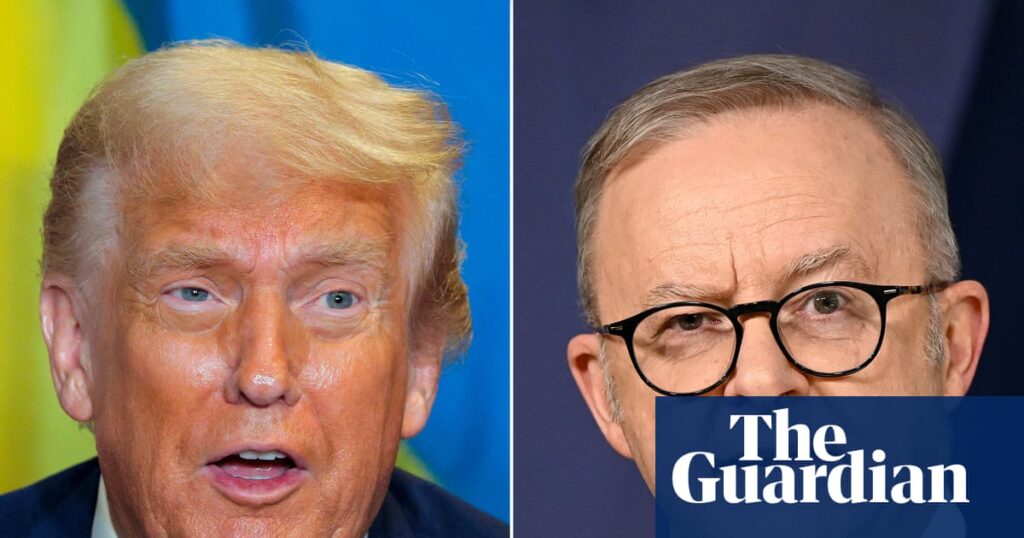
Australian Prime Minister Anthony Albanese is set to meet with U.S. President Donald Trump at the White House, marking a significant diplomatic engagement aimed at strengthening bilateral ties. The meeting, scheduled for later this month, will focus on several key issues, including the Aukus agreement, defense spending, trade tariffs, critical minerals, and building diplomatic rapport.
Aukus Agreement Under Review
The Labor government is optimistic about the U.S. review of the Aukus agreement, which allows Australia to purchase American nuclear-powered submarines. This optimism is bolstered by Australia’s substantial financial contributions to American shipyards and the enthusiastic support from congressional leaders. Pat Conroy, the Australian defense industry minister, described this support as “evangelical.”
However, uncertainty remains over the review process. There are concerns that President Trump might seek to renegotiate terms or alter timelines to favor American interests. A Pentagon spokesperson recently confirmed that the review, initially signed by former President Joe Biden, is still ongoing, stating,
“The AUKUS initiative is still under review. We have no further AUKUS updates to announce at this time.”
An explicit endorsement from President Trump would be a relief for Albanese, especially after Trump’s earlier query, “what does that mean?” regarding Aukus. Despite this, the Australian government remains confident, having already invested US$1 billion in American manufacturing, with another billion due by the year’s end.
Domestically, opinions on Aukus are mixed. A poll by the United States Studies Centre (USSC) revealed that 17% of Australians support canceling the agreement, 44% oppose cancellation, and 39% remain unsure. Only 27% believe the government has adequately explained the necessity of nuclear submarines.
Defense Spending Discussions
Defense spending is another critical topic on the agenda. President Trump may urge Australia to increase its defense budget. In June, U.S. War Secretary Pete Hegseth suggested Australia should raise its defense spending to 3.5% of GDP, a significant increase from the projected 2.4% by 2033-34. This increase would amount to an additional $40 billion, aimed at encouraging allies to “share the burden.”
Prime Minister Albanese and his government have resisted committing to a specific target, preferring to allocate defense funds as needed. Defense Minister Richard Marles recently highlighted the government’s efforts to enhance Australian defense capabilities, citing investments in a new defense precinct at Henderson, missile systems, drones, and seacraft.
Despite these efforts, public sentiment is shifting. The USSC poll indicates a decline in confidence in the U.S. alliance, with only 42% of Australians believing it enhances national security, down 13% since 2024. Additionally, 54% think Australia should maintain the alliance.
Trade Tariffs and Economic Concerns
Trade and tariffs remain contentious issues. Australia faces a 10% baseline tariff, alongside sector-specific tariffs on steel and aluminum. While the government consistently advocates for tariff reductions, significant changes are not anticipated soon.
Some argue that Australia’s low tariff rates provide a competitive advantage in certain sectors, as Australian products compete with exports from countries with higher tariffs. However, concerns persist about potential new tariffs, especially on pharmaceuticals, following the U.S. response to similar policies on big tech.
Critical Minerals: A Strategic Asset
Albanese’s visit is expected to include discussions on critical minerals, a vital component of advanced technology. Australia possesses vast deposits of rare minerals, such as lithium and cobalt, which are in high demand globally.
During his recent visit to Washington, Treasurer Jim Chalmers emphasized Australia’s potential as a reliable supplier of critical minerals. He noted that access to these resources could be “distorted,” hinting at China’s export control plans, and expressed Australia’s willingness to collaborate closely with the U.S. on supply chains.
Access to these minerals could serve as a strategic advantage for Albanese in negotiations with the U.S.
Building Diplomatic Rapport
The meeting itself is seen as a diplomatic success for Albanese, who has faced criticism for the delay in securing a face-to-face with Trump. Opposition leader Sussan Ley remarked, “this meeting could have, and should have, occurred sooner.”
Labor government sources remain unfazed by the timing, highlighting Australia’s favorable tariff deals and positive Pentagon feedback on Aukus. Furthermore, Trump has generally spoken positively about Australian issues, with the leaders having held productive phone conversations.
Given the backdrop of tense White House meetings with other world leaders, some government sources believe an earlier meeting might have been counterproductive. The timing of Albanese’s visit, coinciding with Trump’s diplomatic successes in the Middle East and renewed focus on the Russia-Ukraine conflict, could prove advantageous for the Australian Prime Minister.






